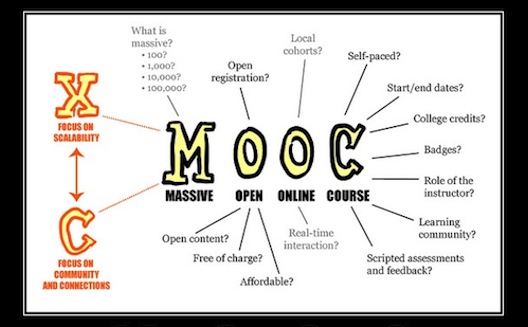What are MOOCs, and how can you benefit from them?


One of the hallmarks of an established education system is its
glacial pace of change. For all of the recent advances in
technology, we still deliver education in pretty much the same way-
one of the few structures that still hasn’t changed since the early
1900s is that of a classroom or lecture hall.
But with the rise of Massive Open Online Courses (MOOCs, pronounced
“mooks”), everything could change. Last year was dubbed
the year of the MOOC, with the technology that enables the
courses called the most important
education technology in 200 years. Even Clayton Christensen,
the father of disruptive innovation, has given a nod to its
disruptive potential.
If you are like many busy entrepreneurs in the Middle East, you
might be wondering what exactly a MOOC is and what all the hype is
about. Massive Open Online Courses are classes that are offered to
a large number of students, over the internet, for free. In a
typical MOOC, students watch short video lectures online and
complete assignments that are graded either by machines or by their
peers. This format allows a single professor to teach a class of
several thousand students in a personalized
fashion.
Online education is of course not a new phenomenon. In fact,
distance education through correspondence has been around as early
as 1873. The University of Phoenix offered its first online degree
back in 1989, and MOOCs themselves first emerged in 2008.
The recent MOOC hype is due to the fact that elite American
universities have embraced them and are
“driving the charge”. It’s not the first time these
institutions have brought their content online; the Massachusetts
Institute of Technology (MIT) launched “MIT OpenCourseWare” in
October 2002. However; unlike MOOCs, these courses were not
interactive and didn’t offer live assignments or ways for students
to demonstrate their knowledge.
MOOCs are now seen to represent the first real opportunity for
democratizing higher education, as they offer courses from the best
institutions to everyone around the world, for the cost of an
Internet connection – creating “Harvard grads” all the way from
couches in Abu Dhabi.
Who are the Major MOOCs?
There are three key players in the MOOC arena as of
May 2013, all of which are based in the United States. They are
Udacity, Coursera, and edX.
Udacity was the first. It works directly with professors rather
than institutions. Coursera, which signs contracts directly with
colleges, is now the largest, with over 330 courses in five
different languages from 62 partner universities. Both Udacity and
Coursera are for-profit.
EdX, on the other hand, is a not-for-profit joint venture between
Harvard and MIT that also partners with universities. Notably, edX
will
open-source its code at the beginning of the next month, so
that anybody can build their own platform using its courses.
Like any innovation, MOOCs also have their
opponents. Some elite schools have flat out rejected
the concept in its current form, as there are serious concerns
and unanswered questions about the quality of learning that takes
places in a MOOC (it perpetuates the “information dispensing model
of teaching” and a lack of “real” social interaction, some
say).
Others are concerned about the credentials it offers (the
overwhelming majority of MOOCs are not for credit) and the model’s
sustainability (how will the MOOC providers make money on free
courses?) and high dropout rates (reaching 95% in some cases).
However, none of these concerns are serious enough to create a
sizeable dent in the traction MOOCs are experiencing, and these
questions are being addressed as it evolves.
The Opportunity in the Middle East
Keeping in mind the significant language barrier (no
provider has any courses in Arabic yet), MOOCs present a great
opportunity for regional entrepreneurs on two counts.
First, several courses on entrepreneurship and related fields have
already been developed, the most prominent of which is Steve
Blank’s “How to
Build A Startup”. Udacity.
Coursera and edX also offer
several classes on technology and entrepreneurship that will be
helpful to regional entrepreneurs.
Second, MOOCs present a great business opportunity for regional
entrepreneurs, like Eduudle’s
Bassem Fayek from Egypt (now SkillAcademy), that are willing
to experiment with different business models and capitalize on what
appears to be the beginning of a new industry.
MOOCs will most likely not be the silver bullet that “fixes” higher
education – if there will ever be a silver bullet in education (or
any sector). However, with no Arab university ranked in the top 100
universities worldwide, and employers complaining about a serious
skills gap, MOOCs have the potential to be part of an affordable
solution that brings better quality higher education to the Arab
world.
In the words of Prof. Mohammed Qayoumi, President of San Jose State
University – one of the universities taking the charge on MOOC
adoption in the US, “MOOCs can have even more of an impact in
emerging economies given their relatively large youth
populations.”
[photo adapted from Mathieu Plourde's MOOC poster].


